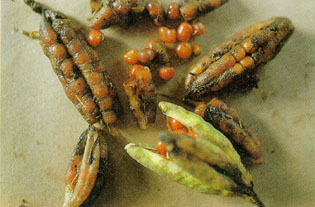a. Serving or tending to abbreviate; shortening; abridging. [ 1913 Webster ]
n. [ L. abditorium. ] A place for hiding or preserving articles of value. Cowell. [ 1913 Webster ]
Abecedarian psalms,
hymns
n. A primer; the first principle or rudiment of anything. [ R. ] Fuller. [ 1913 Webster ]
a. Containing abjuration. [ 1913 Webster ]
a. Pertaining to ablution. [ 1913 Webster ]
adj.
a. [ L. absolutorius, fr. absolvere to absolve. ] Serving to absolve; absolving. “An absolutory sentence.” Ayliffe. [ 1913 Webster ]
a. Conferring absolution; absolutory. [ 1913 Webster ]
a. (Zool.) Belonging to the order of fishes having spinose fins, as the perch. --
‖n. pl. [ NL., from Gr. &unr_; thorn + &unr_; fin, dim. fr. &unr_; wing. ] (Zool.) An order of fishes having some of the rays of the dorsal, ventral, and anal fins unarticulated and spinelike, as the perch. [ 1913 Webster ]
a. (Zool.) Having fins in which the rays are hard and spinelike; spiny-finned. [ 1913 Webster ]
a. Accelerative. [ 1913 Webster ]
a. Accompanying, as a subordinate; additional; accessory; esp., uniting in, or contributing to, a crime, but not as chief actor. See Accessory. [ 1913 Webster ]
To both their deaths thou shalt be accessary. Shak. [ 1913 Webster ]
Amongst many secondary and accessary causes that support monarchy, these are not of least reckoning. Milton. [ 1913 Webster ]
n.;
Accessary before the fact (Law),
Accessary after the fact,
☞ This word, as used in law, is spelt accessory by Blackstone and many others; but in this sense is spelt accessary by Bouvier, Burrill, Burns, Whishaw, Dane, and the Penny Cyclopedia; while in other senses it is spelt accessory. In recent text-books on criminal law the distinction is not preserved, the spelling being either accessary or accessory. [ 1913 Webster ]
a. [ L. accessorius. See Access, and cf. Accessary. ] Accompanying as a subordinate; aiding in a secondary way; additional; connected as an incident or subordinate to a principal; contributing or contributory; said of persons and things, and, when of persons, usually in a bad sense;
☞ Ash accents the antepenult; and this is not only more regular, but preferable, on account of easiness of pronunciation. Most orhoëpists place the accent on the first syllable. [ 1913 Webster ]
n.;
a. Pertaining to, or expressing approval by, acclamation. [ 1913 Webster ]
adj. Marked or produced by accretion. [ WordNet 1.5 ]
a. [ L. accusatorius, fr. accusare. ] Pertaining to, or containing, an accusation;
a. Usual; customary. [ Archaic ] Featley. [ 1913 Webster ]
n. [ L. acetaria salad plants. ] An acid pulp in certain fruits, as the pear. Grew. [ 1913 Webster ]
n. The act or method of ascertaining the strength of vinegar, or the proportion of acetic acid contained in it. Ure. [ 1913 Webster ]
n. [ L. acidus acid + -metry. ] (Chem.) The measurement of the strength of acids, especially by a chemical process based on the law of chemical combinations, or the fact that, to produce a complete reaction, a certain definite weight of reagent is required. --
n. [ Gr. &unr_; to hear + -metry. ] The measuring of the power or extent of hearing. [ 1913 Webster ]
n. Acquirement. [ Obs. ] Barrow. [ 1913 Webster ]
a.
a.
n.
n.
n. Chemistry in its relations to actinism. Draper. [ 1913 Webster ]
n.
n.;
a. Additional. [ R. ] Herbert. [ 1913 Webster ]
a. Tending to add; making some addition. [ R. ] Arbuthnot. [ 1913 Webster ]
a. Containing counsel or warning; hortatory; advisory. [ Obs. ] Potter. [ 1913 Webster ]
n. [ Gr.
a. [ L. adjuratorius. ] Containing an adjuration. [ 1913 Webster ]
a. [ L. adjutorius. ] Serving to help or assist; helping. [ Obs. ] [ 1913 Webster ]
a. [ Pref. ad- + maxillary. ] (Anat.) Near to the maxilla or jawbone. [ 1913 Webster ]
a. Adminicular. [ 1913 Webster ]
a. Pertaining to admission. [ 1913 Webster ]
a. [ LL. admonitorius. ] That conveys admonition; warning or reproving;
a. [ Pref. a- (for on) + dry. ] In a dry or thirsty condition. “A man that is adry.” Burton. [ 1913 Webster ]
a. See Astrictory. [ 1913 Webster ]
a. [ L. adulatorius, fr. adulari: cf. OF. adulatoire. ] Containing excessive praise or compliment; servilely praising; flattering;
A mere rant of adulatory freedom. Burke. [ 1913 Webster ]
n.;
☞ It is adultery on the part of the married wrongdoer.
You might wrest the caduceus out of my hand to the adultery and spoil of nature. B. Jonson. [ 1913 Webster ]
a.
n.;
His ancient knot of dangerous adversaries. Shak. [ 1913 Webster ]
Agree with thine adversary quickly. Matt. v. 25. [ 1913 Webster ]
It may be thought that to vindicate the permanency of truth is to dispute without an adversary. Beattie. [ 1913 Webster ]
The Adversary,

